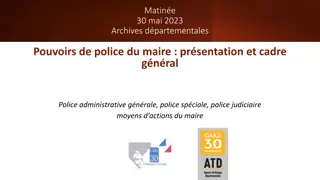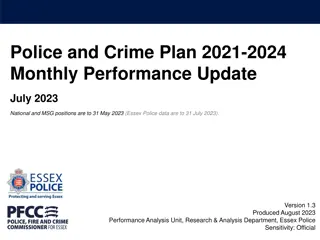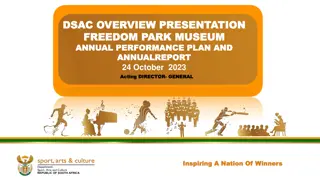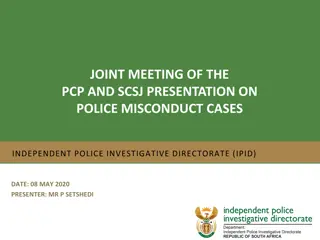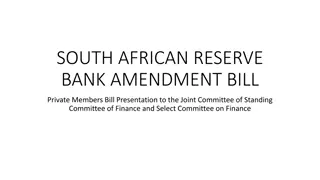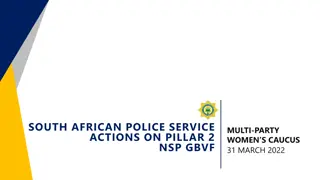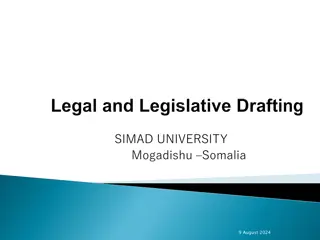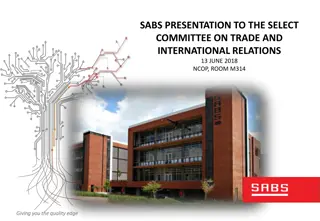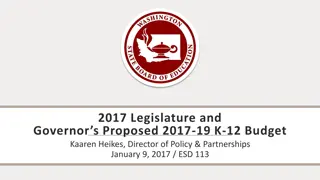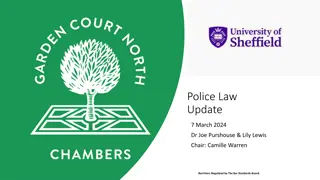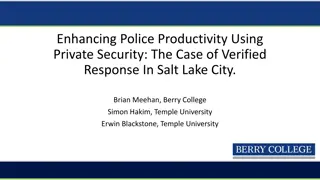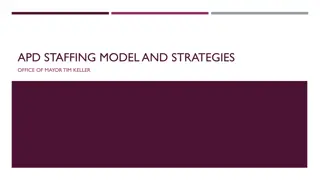South African Police Service Legislative Mandate Overview
The South African Police Service is mandated by various legislative acts to combat, prevent, and investigate crime. This presentation provides insight into the legal frameworks, such as the Constitution of the Republic of South Africa, Criminal Procedure Act, Firearms Control Act, and more, that govern the operations of the police service in upholding law and order. The focus is on ensuring public safety and security through the implementation of relevant laws and regulations.
Download Presentation

Please find below an Image/Link to download the presentation.
The content on the website is provided AS IS for your information and personal use only. It may not be sold, licensed, or shared on other websites without obtaining consent from the author.If you encounter any issues during the download, it is possible that the publisher has removed the file from their server.
You are allowed to download the files provided on this website for personal or commercial use, subject to the condition that they are used lawfully. All files are the property of their respective owners.
The content on the website is provided AS IS for your information and personal use only. It may not be sold, licensed, or shared on other websites without obtaining consent from the author.
E N D
Presentation Transcript
South African Police Service International Disaster Risk Reduction Presentation 5 December 2019 08/08/2024 1
BACKGROUND The South African Police Service is mandated by Section 205 of the Constitution of the Republic of South Africa 1996 (ACT 108 of 1996) to combat, prevent and investigate crime. The Government has through the JCPS Cluster reaffirmed its commitment to achieving the outputs of the Delivery Agreement which deals with Outcome 3: All People in South Africa are and feel safe by going beyond the call of duty in safeguarding the society in fighting crime. The JCPS Cluster has been entrusted through the NATJOINTS and PROVJOINTS to ensure the realisation of a safe and secure country.
LEGISLATIVE MANDATE Constitution of the Republic of South Africa, 1996 (Act 108 of 1996) Criminal Procedure Act, 1977 (Act No. 51 of 1977) Prevention and Combating of Corrupt Activities Act, 2004 (Act No. 12 of 2004) Firearms Control Act, 2000 (Act No. 60 of 2000) Independent Police Investigative Directorate Act, 2011 (Act No. 1 of 2001) South African Police Service Act, 1995 (Act No. 68 of 1996) National Strategic Intelligence Act, 1994 (Act No. 39 of 1994) Inter-Governmental Relations Framework Act, 2005 (Act No. 13 of 2005) Private Security-Industry Regulation Act, 2001 (Act No. 56 of 2001) National Key Points Act, 1980 (Act No. 102 of 1980)
LEGISLATIVE MANDATE Explosives Act, 1956 (Act No. 26 of 1956) National Traffic Act, 1996 (Act No. 93 of 1996) National Land Transport Act, 2009 (Act No. 5 of 2009) Tear-Gas Act, 1964 (Act No. 16 of 1964) Protection of Constitutional Democracy Against Terrorist and Related Activities Act, 2004 (Act No. 33 of 2004) Dangerous Weapons Act, 2013 (Act No. 15 of 2013) AARTO ACT, 1998 (Act No 46 of 1998) Cross Border Road Transport Act, 1998 (Act No. 4 of 1998) Second-Hand Goods Act, 2009 (Act No. 6 of 2009) Control of Access to Public Premises and Vehicles Act, 1985 (Act No. 53 of 1985)
LEGISLATIVE MANDATE Legislative Framework South African Police Service Act (Act No 68 of 1995) South African Police Service Act, 1995 (Act No. 68 of 1995) Regulations Crime Scene Management Directives Crowd Control Directives Intergovernmental Relations Framework Act, 2005 (Act No. 13 of 2005) The Disaster Management Act, 2002 (Act No. 57 of 2002), and amendments National Disaster Management Framework of 2005, and amendments Institutionalise Disaster Management preparedness, preparation, response and recovery;
LEGISLATIVE MANDATE National Veld and Forest Fire Act. 1998 (Act No 101 of 1989) Safety at Sports and Recreational Events Act, 2010 (Act No 2 of 2010) National Road Traffic Act, 1993 (Act No. 96 of 1993) South African Maritime and Aeronautical Search and Rescue Act, (Act No 44 of 2002) and regulations. Institutionalise the requirements of the South African Maritime and Aeronautical Search and Rescue Act, (Act No 44 of 2002) Municipal legislation where applicable
Institutional Arrangements STRATEGIC (NATJOINTS) This is an operational arm of the Justice Crime Prevention & Security (JCPS) Cluster ( Director Generals from various Environments) Comprises all the operational heads of member departments (DDG) Extra participating stakeholders invited as determined by situation Chairperson changes according to Constitutional Mandate, incident or issue to be managed All departments manage own line-function responsibilities (Unified command) Functions through consensus decision-making The main function of the NATJOINTS is to coordinate the strategic planning for, and the execution of all law enforcement, crime combating and other operations relating to safety, security and stability between the member Departments of the Justice, Crime Prevention and Security Cluster.
Institutional Arrangements NATJOC National Operational Arrangements Grouping of senior representatives (LINE FUNCTION EXPERTS) from relevant government departments, and other required role-players, who are tasked to manage designated or unexpected events/situations at National, Provincial or Local level within the safety and security sphere, in a coordinated manner from a centralised venue, on behalf of the JCPS Cluster of Government. Priority committees are established to address all identified shortcomings and to provide guidance to relevant role players
Institutional Arrangements NATJOC National Operational Arrangements JCPS DG s reactivated NATJOC since 1 Feb 2011 All relevant departments to be represented Main (permanent) : Departments rendering 24 hr service SAPS, SANDF, DCS, SARS CUSTOMS, DHA, DAFF, DOH, ICC. and others. Secondary (where required)- office hours DoJ&CD, NPA, DEA, FIC, etc. Co-opted (where required) IEC, SAWS, ESKOM, TELKOM etc. Function 24/7 Manage all national-driven operations Monitor all provincial operations flashpoint responses, contributing to situational awareness Provide first line of response to national crises
Institutional Arrangements PROVJOC Provincial Operational Arrangements Grouping of senior representatives (LINE FUNCTION EXPERTS) from relevant government departments, and other required role-players, who are tasked to manage designated or unexpected events/situations on Provincial level in the safety and security sphere, in a coordinated manner from a centralised venue, on behalf of the JCPS Cluster of Government.
Institutional Arrangements PROVJOC Provincial Operational Arrangements Joint Operations Centre Operations room collates all relevant departmental information to create situational awareness Line function experts Must have relevant operational experience Must be on senior managerial level JOCOM Director or higher JOC Assistant Director or higher Direct links with own operational centres and databases Coordinated Joint decision-making through consensus Centralised venue Enhances immediate decision-making Eliminates delays in gathering role-players in times of crisis Allows for innovative inter-agency best practices and solutions
Institutional Arrangements District JOC District Operational Arrangements Grouping of senior representatives (LINE FUNCTION EXPERTS) from relevant government departments, and other required role-players, who are tasked to manage designated or unexpected events/situations on local or district level in the safety and security sphere, in a coordinated manner from a centralised venue, on behalf of the JCPS Cluster of Government.
Institutional Arrangements District JOC District Operational Arrangements Joint Operations Centre Operations room collates all relevant departmental information to create situational awareness Line function experts Must have relevant operational experience JOCOM Director or higher JOC Assistant Director or higher Direct links with own operational centres and databases Coordinated Joint decision-making through consensus Centralised venue Enhances immediate decision-making Eliminates delays in gathering role-players in times of crisis Allows for innovative inter-agency best practices and solutions
Blackout of Power Supply The following are responsibilities of the SAPS during blackout of power supply Ensuring the safety and security of all people and property affected by the blackout Providing support and advice to the affected sector Conducting crime prevention operations around the area Responding and attending to incidents Crime scene management Investigation of crime
Blackout of Power Supply CHALLENGES Maintenance of a safe and secure society Maintenance of public order Looting, Theft, Panic, Arson Violence, Mass Protest Protection of Strategic Installations (Private Security) SAPS act according to mandate
Blackout of Power Supply CHALLENGES Maintenance of essential services Water supply Health sector Sewerage management Communication sector Cellular Media Data retention Banking sector Petroleum sector Retail industry
Major Fire Major Fire Definition Any fire with a wide impact, including forest fires and veld fires High probability during dry season, aggravated with high temperatures National Response (General) Each Department, establishment, act according to their mandate Coordinating all actions on National Level (NDMC Chair) Where more than one province are affected Where a province do not have the means in dealing with the fire Assist in the provinces
Major Fire The following are responsibilities of the SAPS during Major Fires Ensuring the safety and security of all people and property affected by the blackout Providing support and advice to the affected sector Conducting crime prevention operations around the area Responding and attending the incident Crime scene management Investigation of crime
Expectations It is expected that: Joint interdepartmental planning initiatives will be conducted Regular simulations will be conducted to ensure readiness Maximum participation by relevant role players Risk assessment and risk prevention initiatives are undertaken Linkage of systems for purposes of early warning and sharing of information Structured integrated communication strategy Coordinated approach by all role players
Communication Coordinated media communication Communication consulted with unified command system Avoid sharing unconfirmed communication publicly Avoid panic in using visual communication Share information to safely evacuate affected areas Operational communication Share operational equipment where needed Share operational communication / information in JOC Document all communication shared Restricted communication Communication related to victims, personal information To be communicated with dignity
Conclusion Disaster incidents affect everybody irrespective of status Unified command systems are the best way of managing incidents Disciplined and knowledgeable officials must be deployed Succession plans must be established to ensure continuity Linkage of various systems within the environments for sharing of information Training of practitioners within the environments
THANK YOU REA LEBOGA HA KHENSA 08/08/2024 22






